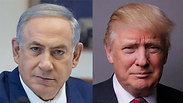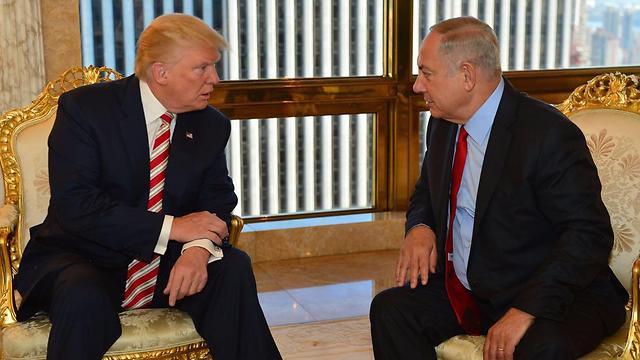
Prime Minister Benjamin Netanyahu (L) and US President-elect Donald Trump
צילום: אמיל סמלן, רויטרס
A window of opportunity for Israel-US relations
Analysis: Donald Trump’s victory in the US presidential race is an opportunity for Israel to turn over a new leaf with America, influence the new administration’s policy—and be an integral part of it.
US President-elect Donald Trump will have a dramatic impact on the direction the United States moves in. His influence is expected to include all aspects of the international systems. It’s only natural that Israeli officials are attempting to understand his impact on Israeli national security.

Unlike previous administrations, which had a clear agenda before being elected, Israel is facing an administration with an undefined policy on Middle Eastern affairs. Israel’s conduct will be significant in determining the Trump administration’s policy.

Trump and Netanyahu in New York in September. A pro-Israel position despite problematic comments made in the past (Photo: Kobi Gideon, GPO) (קובי גדעון, לע״מ)
Israel and the US have a solid basis of shared values and interests. There is no alternative to the US as the most important world power supporting Israel. Neither Russia nor China help Israel’s security with billions of dollars or supply modern arms systems to reinforce the IDF. Nor are they the ones that veto anti-Israel resolutions at the Security Council.
Although foreign policy was not a significant factor in the elections, Trump voiced a pro-Israel position despite problematic comments he had made in the past. Israel has an opportunity to turn over a new leaf, influence the policy—and be an integral part of it. When the prime minister is invited to the White House, he should reach understandings with the president on six important points which will serve as the basis for restoring the special relations and strengthening the strategic alliance between the two countries.
First of all, the trust that was lost during the Obama era must be restored: The leaders should present their top interests and red lines to each other. It’s important that they agree not to surprise each other. Renewing the relationship between the president and prime minister is extremely important.
Secondly, it should be noted that the US pursued a foreign policy that negatively affected its relations with its allies in the region. Not just Israel, but also Egypt, Saudi Arabia and Turkey want to see a different policy. Israel’s good relations with Egypt and Jordan, its common interests with Saudi Arabia and a renewal of its relations with Turkey could serve as a basis for a strong alliance which will better deal with the challenges.
The third point has to do with the crisis in Syria. The 500,000 people who have died, the 2 million who have been injured and the 10 million refugees are a moral stain on the Western world. We must examine how the US and its allies shape a different strategy vis-à-vis the Russians and the Iranians who support the murderous Assad regime.
The fourth point is Iran, the most significant threat to Israel in the long run. The nuclear agreement is an established fact, and in the short run its risks are low compared to other alternatives. It is unlikely that the Trump administration will cancel it. Nonetheless, this is a problematic agreement in the long run, when the Iranians receive legitimacy for a wide, advanced nuclear program and are at point-blank range from a bomb. The Israelis and Americans should agree on the principle that a regime calling for Israel’s destruction will not receive legitimacy for a wide nuclear program, as the agreement gives Iran in another decade. We must restore full intelligence coordination to uncover Iranian violations and reach an agreement that the US will give Israel all the operational abilities to act, if all other alternatives are exhausted.
The fifth point is the peace process. The change of president is an opportunity to look into new paradigms for agreements combining the Arab world. New ideas which will preserve the two-state idea as possible but will recognize the impossibility of reaching a permanent agreement at this time. Renewing the understandings according to the George W. Bush letter from 2004, which US President Barack Obama and Prime Minister Benjamin Netanyahu ignored, is a first step. Building in Jerusalem’s Jewish neighborhoods cannot be seen as equal to building in areas that will not be part of Israel. Such an agreement will significantly reduce the tension around the settlement issue, which has poisoned the relations.
Finally, Israel’s security, as a fundamental part of the relations, should be validated and reinforced: the multi-year aid, maintaining the relative advantage in weapon systems, supporting missile defense programs and the agreements on the special strategy abilities attributed to Israel will all strengthen the special relations between the two countries and serve as a basis for diplomatic breakthroughs.
Major-General (res.) Amos Yadlin is the director of Tel Aviv University’s Institute for National Security Studies (INSS) and served as head of the IDF's Military Intelligence Directorate.










